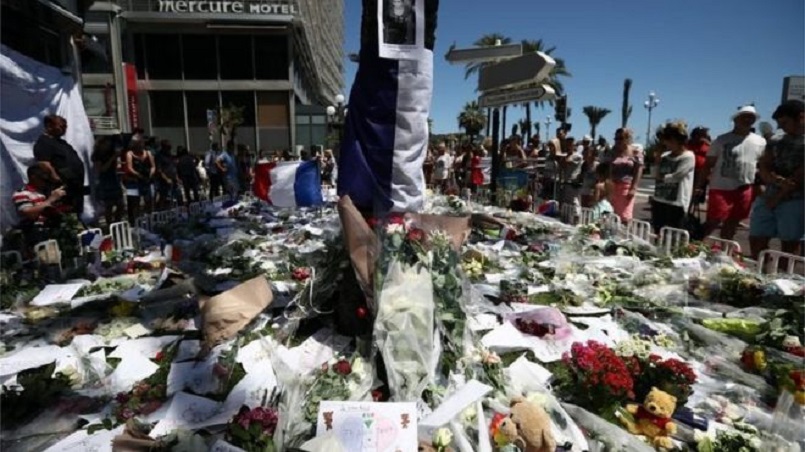
France has called up 12,000 police reservists to help boost security after Thursday's attack in Nice in which more than 80 people were killed.
Interior Minister Bernard Cazeneuve also appealed to "all willing French patriots" to sign up as reservists, to help protect the country's borders.
Mohamed Lahouaiej-Bouhlel drove a lorry along the seafront through crowds before police shot him dead.
So-called Islamic State claimed one of its followers carried out the attack.
A news agency linked to the group, Amaq Agency, said: "He did the attack in response to calls to target the citizens of the coalition that is fighting the Islamic State."
Five people believed to be linked to Lahouaiej-Bouhlel, including his estranged wife, are in police custody, the Paris prosecutor's office said.
France, which on Saturday began three days of mourning, already has 120,000 police and military deployed around the country. Its 12,000 reservists are made up of 9,000 military police officers and a further 3,000 regular police officers.
"I want to call on all French patriots who wish to do so, to join this operational reserve," Mr Cazeneuve said.
Some 30,000 people were on the Promenade des Anglais at the time of the attack on Thursday night.
Of the 84 who died, 10 were children. A total of 303 people had been taken into hospital following the attacks, the French health department confirmed on Saturday. Of those, 121 remain in hospital, 30 of whom are children, and 26 people are still in intensive care - including five children.
Residents of Nice and foreign tourists were killed. As well as France, the dead included nationals of Algeria, Germany, Tunisia, Switzerland, the US, Ukraine, Armenia, Russia, Morocco, Madagascar and Poland.
Prime Minister Manuel Valls said that "we know now that the killer was radicalised very quickly".
"The claim on Saturday morning by Islamic State and the fast radicalisation of the killer confirms the Islamist nature of this attack," he told Le Journal du Dimanche.
Lahouaiej-Bouhlel, a 31-year-old Tunisian, drove the lorry 2km (1.2 miles) along the promenade, at times zigzagging to target people, prosecutors said.
President Francois Hollande met defence and security chiefs and cabinet ministers on Saturday and called for national unity.
He said: "We are in a time when, and we have seen it, there is a temptation to divide the country. Faced with these temptations, faced with this risk, we must recall the unity and cohesion of this country."
Mr Hollande has moved to extend a state of emergency by three months.
It has been in place across France since the attacks carried out by militants from so-called Islamic State in Paris on 13 November that left 130 people dead.
Mr Hollande had proposed lifting the state of emergency on 26 July, but reversed his decision after the Nice attack.
Meanwhile, France's National Front leader Marine Le Pen has called for national service to be brought back and a national guard to be created to protect France in the wake of Nice attacks.
Speaking in Nanterre, on the outskirts of Paris, she said the budget for the armed forces should be increased. She also called on Mr Cazeneuve to resign and said that France had the means to defend itself, but that its leaders were too weak.
Lahouaiej-Bouhlel was known to the police as a petty criminal, but was "totally unknown to intelligence services... and was never flagged for signs of radicalisation," prosecutor Francois Molins said.
A neighbour of Lahouaiej-Bouhlel, who used to live in a high-rise block of flats on Boulevard Henri Sappia with his family, said he did not believe the 31-year-old was involved with IS.
Samiq, who did not want to give his surname, told the Press Association news agency: "I never saw him going to the Mosque. He was not a Muslim. During Ramadan I saw him smoking."
Speaking in Nice, the president of the Regional Council for the Muslim Faith, Boubakar Bekri, said mosques in the area had responded to the attack.
"In all mosques in the region of Alpes-Maritimes, there has been a common prayer calling for vigilance and patience, because these very bad events affect us; and there has been a call for blood donation," he said.
